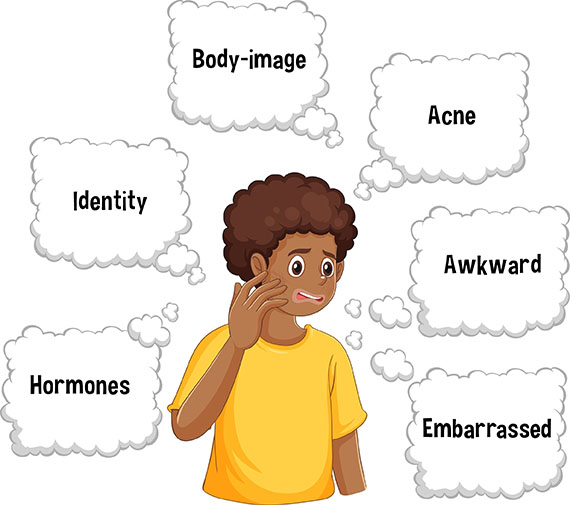

Puberty is a period of rapid physical and emotional changes that occurs during adolescence. It is a time when the body matures and becomes capable of reproduction.
The physical changes of puberty are caused by hormones, which are chemicals produced by the endocrine glands. The main hormones involved in puberty are testosterone in boys and estrogen in girls.
The physical changes of puberty include:
The emotional changes of puberty can be just as dramatic as the physical changes. Adolescents may experience a wide range of emotions, including:
Puberty is a time of great change and upheaval. It is important to remember that these changes are normal and that everyone goes through them at their own pace. If you are struggling with the emotional changes of puberty, it is important to talk to a trusted adult, such as a parent, teacher, or counsellor.
The onset of puberty varies from person to person.

Noun: the period of physical development and transition from childhood to adulthood, during which the body matures and becomes capable of reproduction.
Adjective: relating to puberty.
The word "puberty" comes from the Latin word "puber" (adult).
The first recorded use of the word "puberty" in English was in the 14th century.
What changes happen during puberty?
Question:
Define puberty and explain the physical changes that occur during this stage of development. Discuss the role of hormones in driving these changes and highlight the importance of puberty as a significant milestone in human growth and development.
Answer:
Puberty is a natural and transitional phase of human development during which individuals undergo significant physical, hormonal, and emotional changes that lead to sexual maturity and reproductive capability.
During puberty, several physical changes occur. In girls, these include the development of breasts, growth of pubic and underarm hair, widening of hips, and the onset of menstruation. Boys experience the growth of facial, pubic, and body hair, deepening of the voice, enlargement of the testicles and penis, and an increase in muscle mass.
These changes are driven by hormones, specifically sex hormones like estrogen and testosterone. The hypothalamus and pituitary glands in the brain stimulate the release of these hormones, which initiate the growth and development of primary and secondary sexual characteristics.
Puberty marks a crucial milestone in human growth and development. It signifies the transition from childhood to adulthood, as individuals become capable of reproduction. Additionally, puberty brings about psychological changes, including shifts in emotional responses and social interactions.
Understanding the physical changes and hormonal processes of puberty is essential for individuals, parents, and educators to navigate this period of development. It also underscores the importance of open communication and supportive environments to help adolescents navigate the challenges and embrace the opportunities that come with this significant life stage.
Address
Developing Experts Limited
Exchange Street Buildings
35-37 Exchange Street
Norwich
NR2 1DP
UK
Phone
01603 273515
Email
hello@developingexperts.com
Copyright 2025 Developing Experts, All rights reserved.